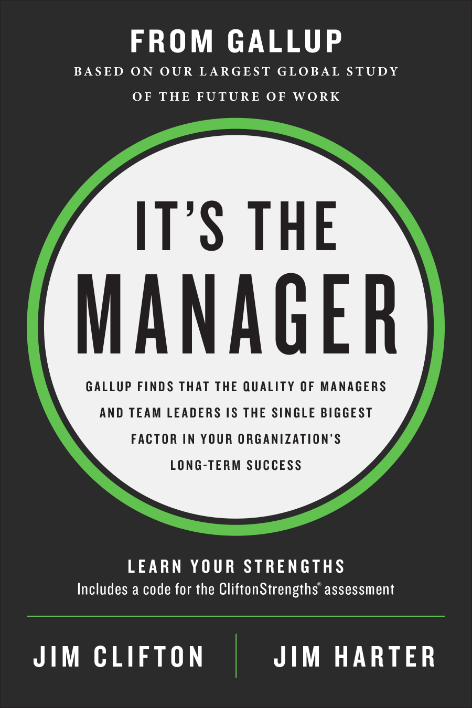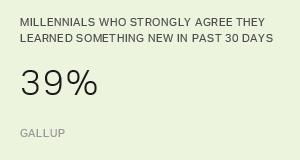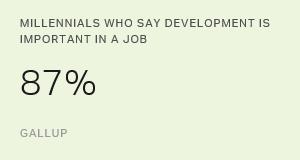Story Highlights
- Millennials have a few discrete workplace demands
- Gallup finds those demands are linked to better business outcomes
- Change your culture to fit millennials' needs and you will increase profit
Gallup's extensive workplace research shows that millennials and their elders are more alike than they are different, but where they're different, they're very different.
As millennials age and gain positions of greater authority, they'll bring differences to the C-Suite with them. That will change business itself.
Is that a good thing?
To be frank, yes.
To be more specific, yes, and leaders should be glad. Because what millennials demand of the workplace is good for business.
As millennials age and gain positions of greater authority they'll bring differences to the C-Suite with them. That will change business itself.
What Do Millennials Want?
Though all workers have 12 basic needs for workplace engagement, Gallup's research about millennials finds that they tend to particularly value certain aspects of the employee experience:
1. Millennials don't just work for a paycheck -- they want a purpose.
For millennials, work must have meaning. Their compensation is important and must be fair, but they're motivated more by mission and purpose than paycheck.
2. Millennials are not pursuing job satisfaction -- they are pursuing development.
Purpose and development drive this generation, and they expect opportunities to learn and grow.
3. Millennials don't want bosses -- they want coaches.
Millennials expect their managers to coach their performance and to value them as people and employees. That requires real relationships, not command-and-control management.
4. Millennials don't want annual reviews -- they want ongoing conversations.
Annual reviews are too infrequent and focus too much on the recent. Millennials need feedback on their current performance, not incidents from the past.
5. Millennials don't want to fix their weaknesses -- they want to develop their strengths.
Fixating on their weaknesses won't inspire millennials to perform. Naming and aiming their strengths will - weaknesses never develop into strengths, but strengths develop infinitely.
6. Millennials don't want a job -- they want a good job.
Millennials want to contribute to an organization that values their strengths and gives them the chance to do what they do best every day. To a millennial, their job is their life.
An Analytical Light
Their elders can gripe -- and have -- that millennials' demands of their workplace sound entitled and narcissistic.
But those demands are also good for business. Very good.
Let's look at the list above in light of Gallup analytics.
Purpose: Gallup finds that one in three employees worldwide strongly agree with the statement, "The mission or purpose of my organization makes me feel my job is important."
By doubling that ratio, business units could realize a 34% reduction in absenteeism, a 41% drop in patient safety incidents and a 19% improvement in quality. Just a 10% improvement in employees' connection with the mission or purpose of their organization would result in a 12.7% reduction in safety incidents, an 8.1% decrease in turnover, and a 4.4% increase in profitability.
Development: The primary reason people quit a job is for "career growth opportunity." Replacing them can cost 150% of each employee's annual salary. And The Society for Human Resource Management says the average U.S. annual turnover rate in 2016 was 18%.
Coaches: Managers account for 70% of the variance in their team's engagement, but only 15% of workers, globally, are engaged and just 23% say their bosses provide meaningful feedback.
Ongoing conversations: Performance reviews inspire only 14% of employees to improve, and just two in 10 employees strongly agree that their performance is managed in a way that motivates them to do outstanding work.
Strengths: Gallup research reveals that the most effective leaders are always investing in strengths. Further, workgroups that receive strengths-based development see 14% to 29% increase in profit and a 10% to 19% increase in sales.
A good job: Gallup's State of the American Workplace report shows that most employees say it's "very important" to have a job that permits greater work-life balance and personal wellbeing.
Meanwhile, 63% believe it is "very likely" or "somewhat likely" that they could find a job as good as the one they have -- and 51% are actively looking for a different job.
Millennial Math
Those numbers are neither entitled nor narcissistic. They're just numbers. Just math -- but it's the math of organizational performance. The math of money.
But it's not the only math -- poor management costs the U.S. between $960 billion and $1.2 trillion per year in productivity lost to disengagement, according to Gallup research. Globally, the cost approaches $7 trillion, or 9% to 10% of GDP.
So, focus on your brand's purpose and aligning workers with it. Develop employees with good coaching. Draft policies that allow people to integrate work and life.
It isn't caving to millennials' demands.
It's how you get performance improvement -- and business results.
Learn more about what employees want and need to stay engaged with your company:
- Download our employee experience perspective paper.
- Sign up to receive exclusive insights about what makes a great workplace from our new book, It's the Manager.
- See how we can work with you to develop your millennials into your future leaders.





